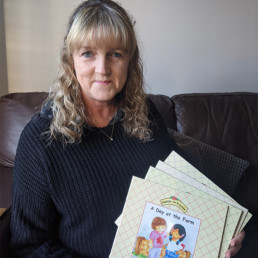
Written by Lesley Berrington
Author of the ‘Hattie and friends’ series of inclusive books. I’m NNEB qualified and former owner of Stepping Stones Day Care Ltd. in Lincoln.
When I started searching for more diverse resources for my nurseries, it was quite easy to find books featuring children from a variety of ethnic backgrounds but disability was just invisible! I found very few story books featuring disability. The ones I did find made the disability ‘special’, I didn’t want that, I wanted to introduce disability without drawing attention to it. It was also important to me that the disability was not mentioned in the text, it was purely incidental so that the character was not defined by their disability. After further research I decided that I could meet this growing demand and Hattie was born!
I created ‘Hattie and friends’ around 15 years ago and, sadly, over that time I’ve seen very little change in the way we present disability in our society. Teachers and Childcare Professionals understand the need and importance for positive images of disability, so my books have been very well received and widely used by them. Unfortunately, I think we still have a long way to go to educate our wider society that books like mine are for ALL children. When I talk to people about my books they often assume that they are for disabled children until I explain the benefits for all children. Yes, disabled children need to see characters like themselves in story books, to give them a sense of belonging, make them feel valued and build their confidence and self -esteem.
My message is that ALL children need to see disabled characters in story books and on television because disability is part of everyday life so it should be included in our media. There are more disabled characters in books and on television than there were 15 years ago but still not enough. I believe every child should own books which include some disabled characters, this will be a small but important step towards improving attitudes to disabled people who face daily struggles from abuse.
Some parents may not have considered being more inclusive when they buy toys, books etc. so we need to raise awareness by having more choice in mainstream shops. How often have you seen disabled characters when buying dolls, puppets, games, jigsaws?
We need to raise awareness and ask – How inclusive is your bookshelf? If children see more disability and they receive a consistent message of respect and acceptance for the differences we have, they’ll see past the disability and understand that we are all unique individuals. Over 8,000 ‘Hattie and friends’ books are now being used to promote positive images of disability all over the UK. This is fantastic but I’d like to see more being bought by parents.
It can be difficult to answer children’s questions about disability so parents may avoid inclusive resources for that reason. We need to educate parents and help them to overcome any insecurities they may have. I’ve written some notes in the back of my book to help, support, and encourage parents to openly discuss any questions raised.
‘’The important message is that all children can be friends and have fun, abilities are not important. All young children accept differences, their curiosity will raise questions and they develop attitudes from the answers they receive. We must show, through our attitudes and actions, that we value all children equally.’’
The Channel 4 programme, ‘The Last Leg’ is a great example of presenting disability in a humorous way that is accessible to all adults. Initially this programme aired during the 2012 Paralympics and was so popular it became a regular show to discuss the news of the week. Their ‘Is it OK?’ segment encourages the public to ask questions without fear of judgement. This is a great way to educate!
During the Paralympic Games we all support Team GB with respect for every athlete’s dedication and determination. It’s a time when sport really unifies the nation and we’re all on the same side. Disability is exciting and cool! Every time I feel excited that this is the push that’s needed to make inclusion go mainstream. Unfortunately, a few weeks later the spotlight is turned off again.
Progress is disappointingly slow!
So, what will the future bring? I truly hope there will be a massive increase in inclusive resources in people’s homes, more disabled people visible in television programmes and films. Not just as a ‘box ticking exercise’ but really breaking down barriers and changing attitudes towards disability in our society.
I’d love to hear your comments.
Website: www.hattieandfriends.co.uk
E-mail: lesley@hattieandfriends.co.uk
Twitter: @Hattiesfriends
Facebook and Instagram: @Hattieandfriendsauthor

